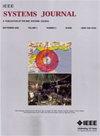Dual-Stage Agglomeration Strategy: An Approach of Flexible Partitioning for Energy Internet
IF 4
3区 计算机科学
Q1 COMPUTER SCIENCE, INFORMATION SYSTEMS
引用次数: 0
Abstract
With the active participation of numerous end-users in the development of low-carbon energy ecosystems, the continuous expansion of the Energy Internet diminishes the timeliness of energy transmission and increases the complexity of energy scheduling, which leads to reduced energy efficiency. To solve it, a partitioning approach based on dual-stage agglomeration for Energy Internet is proposed in this article. First, the entropy weight of Energy Internet is proposed to assess the line significance of energy transmission, while establishing a uniform criterion of judgment by considering the energy loss of heterogeneous energy sources. Second, as the first stage of partitioning, the local expansion and boundary detection mechanism is proposed to realize localized node agglomeration and generate small-scale regions while ensuring all nodes contained in subregions. Furthermore, the hierarchical region agglomeration mechanism is proposed as the second stage of partitioning, which can aggregate the generated small-scale regions and improve the quality of the partitioning result based on flexible partitioning. Through the above stages, the proposed partitioning approach improves energy allocation, transmission and global efficiency of Energy Internet. Finally, case studies of an Energy Internet with 171-node are presented to validate the proposed approach.双阶段集聚战略:能源互联网的灵活分区方法
随着众多终端用户积极参与低碳能源生态系统的发展,能源互联网的不断扩展削弱了能源传输的及时性,增加了能源调度的复杂性,导致能源效率降低。为解决这一问题,本文提出了一种基于双阶段聚集的能源互联网分区方法。首先,提出了能源互联网的熵权,以评估能源传输的线路重要性,同时通过考虑异构能源的能量损耗建立统一的判断标准。其次,作为分区的第一阶段,提出局部扩展和边界检测机制,在确保所有节点都包含在子区域内的前提下,实现局部节点集聚,生成小范围区域。此外,还提出了分层区域聚集机制作为划分的第二阶段,该机制可以聚集生成的小尺度区域,并在灵活划分的基础上提高划分结果的质量。通过上述阶段,所提出的分区方法提高了能源互联网的能源分配、传输和全局效率。最后,介绍了具有 171 个节点的能源互联网的案例研究,以验证所提出的方法。
本文章由计算机程序翻译,如有差异,请以英文原文为准。
求助全文
约1分钟内获得全文
求助全文
来源期刊

IEEE Systems Journal
工程技术-电信学
CiteScore
9.80
自引率
6.80%
发文量
572
审稿时长
4.9 months
期刊介绍:
This publication provides a systems-level, focused forum for application-oriented manuscripts that address complex systems and system-of-systems of national and global significance. It intends to encourage and facilitate cooperation and interaction among IEEE Societies with systems-level and systems engineering interest, and to attract non-IEEE contributors and readers from around the globe. Our IEEE Systems Council job is to address issues in new ways that are not solvable in the domains of the existing IEEE or other societies or global organizations. These problems do not fit within traditional hierarchical boundaries. For example, disaster response such as that triggered by Hurricane Katrina, tsunamis, or current volcanic eruptions is not solvable by pure engineering solutions. We need to think about changing and enlarging the paradigm to include systems issues.
 求助内容:
求助内容: 应助结果提醒方式:
应助结果提醒方式:


